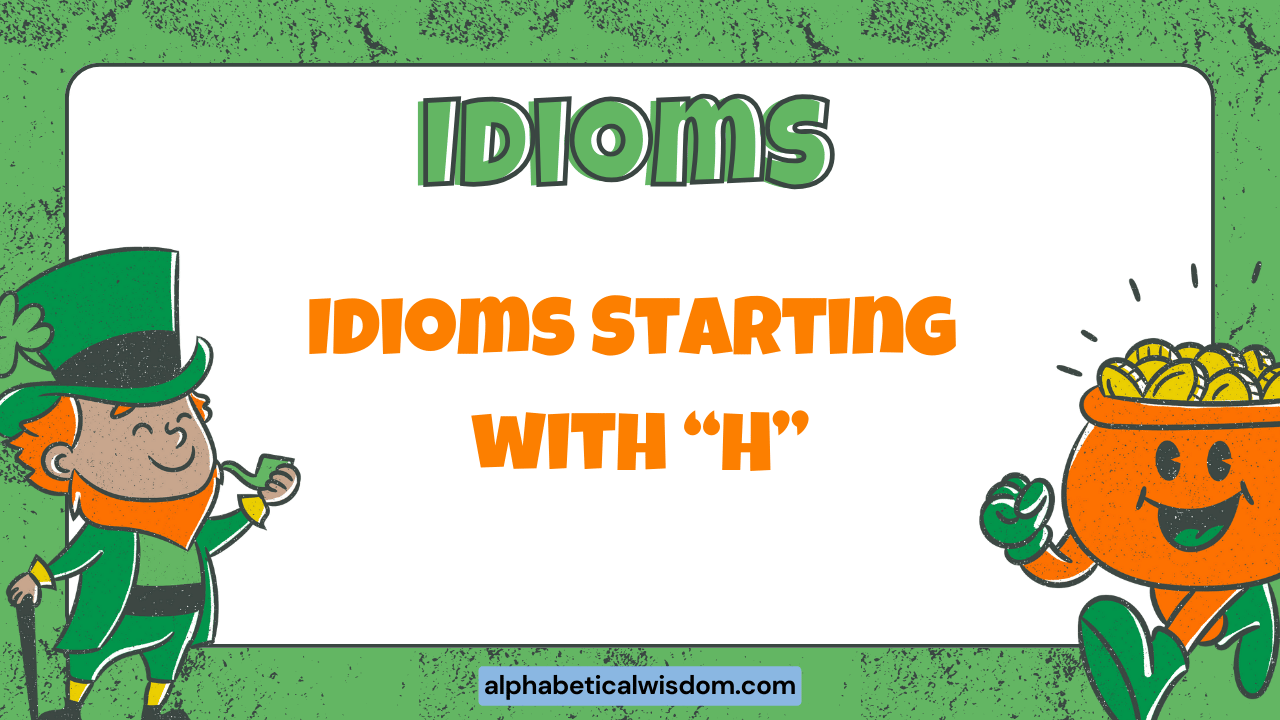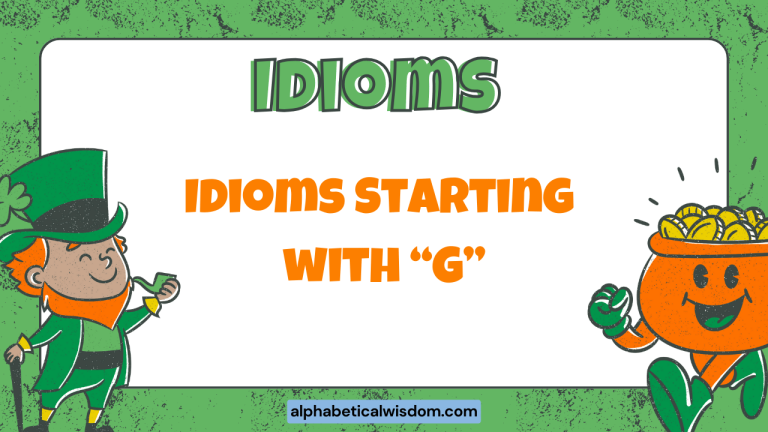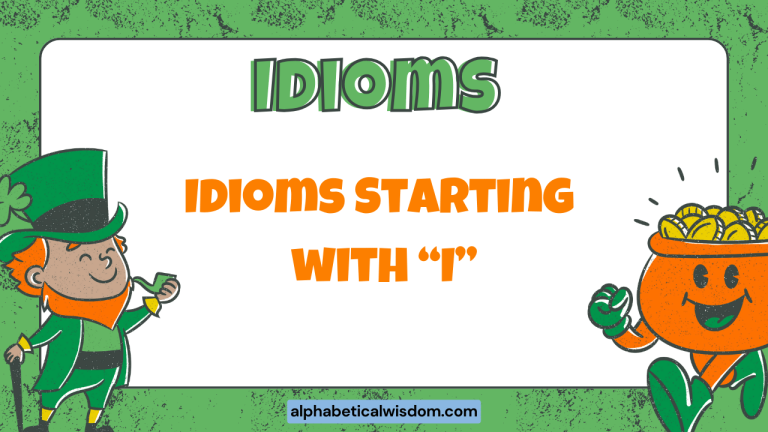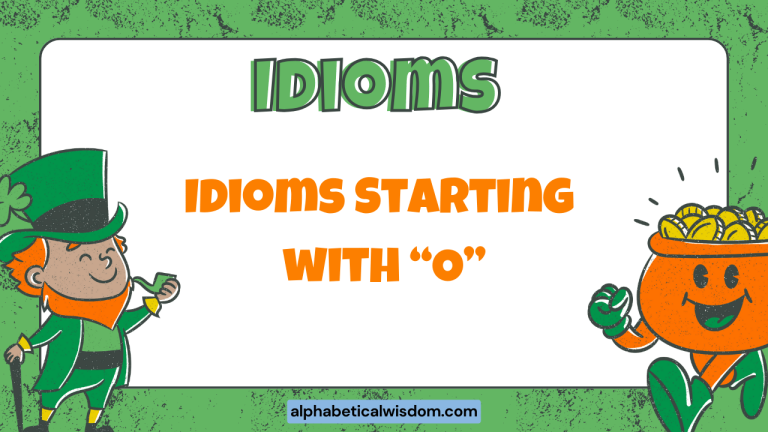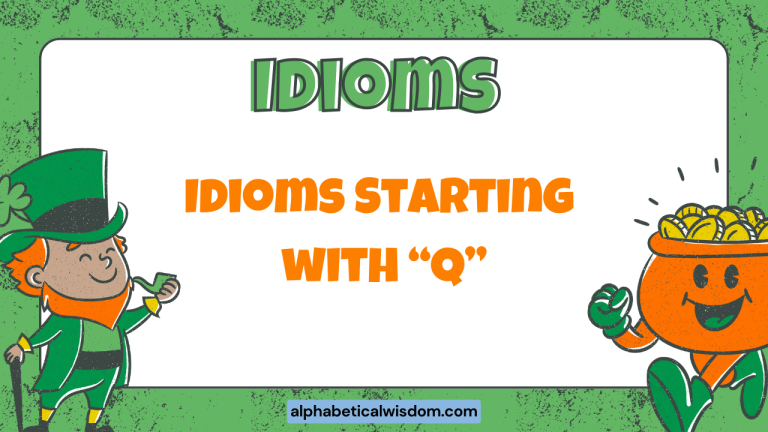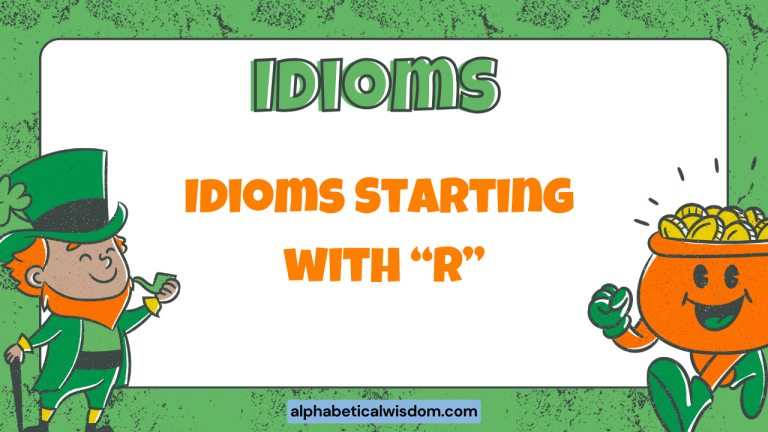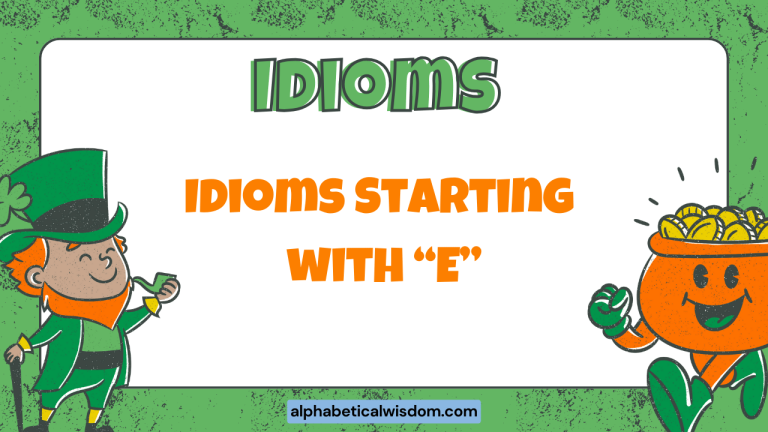Idioms Starting with H: Mastering Everyday English Expressions
Idioms are a vital part of the English language, adding color and depth to everyday conversations and writing. Understanding idioms, especially those starting with ‘H,’ can significantly improve your comprehension and fluency.
This article provides a comprehensive guide to common idioms that begin with ‘H,’ offering clear definitions, examples, and practical exercises to help you master their usage. Whether you’re an ESL learner or a native speaker, this guide will enhance your understanding of idiomatic expressions and their nuances.
Table of Contents
- Introduction
- Definition of Idioms
- Structural Breakdown of Idioms
- Types and Categories of Idioms
- Examples of Idioms Starting with H
- Usage Rules for Idioms
- Common Mistakes with Idioms
- Practice Exercises
- Advanced Topics in Idiom Usage
- Frequently Asked Questions
- Conclusion
Introduction
Idioms are phrases or expressions whose meanings cannot be understood from the ordinary meanings of the words used within them. They add richness and nuance to the English language, making conversations and writing more engaging and expressive.
Mastering idioms, particularly those beginning with the letter ‘H,’ is essential for achieving a deeper understanding of English and improving fluency. This guide offers a comprehensive exploration of ‘H’ idioms, providing definitions, examples, and practical exercises to help you confidently incorporate them into your vocabulary.
This article is designed for English language learners of all levels, from beginners to advanced speakers. Native English speakers can also benefit from this guide by reinforcing their knowledge and gaining a more structured understanding of these common expressions.
By the end of this article, you will be equipped with the knowledge and skills to recognize, understand, and use a wide range of idioms starting with ‘H’ effectively.
Definition of Idioms
An idiom is a phrase or expression where the words, when taken literally, do not represent the actual meaning. Instead, the idiom conveys a figurative meaning that is understood through common usage and cultural context.
Idioms are a fundamental aspect of language, adding color, depth, and nuance to communication. They can be challenging for language learners because the meaning cannot be derived directly from the individual words.
Idioms can be classified based on their structure and function. Some idioms are fixed phrases, meaning the words cannot be changed without altering the meaning.
Others are more flexible and allow for slight variations. Functionally, idioms can act as verbs, nouns, adjectives, or adverbs within a sentence.
The context in which an idiom is used is crucial for understanding its intended meaning. For example, “kick the bucket” means “to die,” which is very different from the literal meaning of the words.
Classification of Idioms
Idioms can be classified into several categories based on their grammatical structure and semantic function. These classifications help in understanding how idioms fit into sentences and how they contribute to the overall meaning.
- Phrasal Verbs: These are idioms that combine a verb with a preposition or adverb (e.g., “hand out,” “hold on”).
- Clichés: Overused idioms that have lost some of their impact (e.g., “hit the nail on the head”).
- Proverbs: Short, well-known sayings that express a general truth or piece of advice (e.g., “honesty is the best policy”).
- Figurative Expressions: General idioms that use metaphorical language (e.g., “have a heart”).
Function of Idioms
Idioms serve various functions in communication, adding depth and color to language. Understanding these functions can help you use idioms more effectively.
- Emphasis: Idioms can emphasize a point or feeling more strongly than literal language.
- Humor: Many idioms are humorous and can add levity to a conversation.
- Cultural Context: Idioms often reflect the culture and history of a language, providing insight into the way people think and communicate.
- Efficiency: Idioms can convey complex ideas in a concise and memorable way.
Contexts of Idioms
The context in which an idiom is used is crucial for understanding its meaning. Idioms can have different meanings in different contexts, so it’s important to pay attention to the surrounding words and phrases.
- Formal vs. Informal: Some idioms are more appropriate for formal settings, while others are better suited for informal conversations.
- Regional Variations: Idioms can vary from region to region, so it’s important to be aware of the local usage.
- Historical Context: Understanding the historical context of an idiom can provide insight into its meaning and usage.
Structural Breakdown of Idioms
Idioms, while seemingly simple, possess underlying structural patterns that contribute to their unique meanings. Recognizing these patterns can aid in understanding and using idioms more effectively.
The structural elements of idioms often involve metaphorical language, cultural references, and historical contexts.
Most idioms cannot be altered grammatically without losing their idiomatic meaning. For example, you can’t change “hit the hay” to “hitting the hay” and retain the same meaning of going to bed.
The structure is fixed, and any alteration changes the literal or intended meaning. Understanding this rigidity is essential for proper usage.
Structural Elements
The structural elements of idioms often include specific combinations of words that create a figurative meaning. These elements can include:
- Verbs: Actions or states of being that are expressed figuratively (e.g., “hang in there”).
- Nouns: Objects or concepts that represent something else metaphorically (e.g., “a heart of gold”).
- Adjectives: Descriptors that add color and detail to the figurative meaning (e.g., “high and dry”).
- Prepositions: Words that connect the elements of the idiom and contribute to its overall meaning (e.g., “head over heels”).
Patterns and Rules
While idioms are not governed by strict grammatical rules, there are patterns that can help you understand and use them correctly.
- Fixed Phrases: Many idioms are fixed phrases, meaning the words cannot be changed without altering the meaning.
- Metaphorical Language: Idioms often use metaphorical language to convey a figurative meaning.
- Cultural References: Idioms often reflect the culture and history of a language.
Types and Categories of Idioms
Idioms can be categorized based on their grammatical structure, semantic function, and thematic content. Understanding these categories can help you recognize and use idioms more effectively.
Common categories include phrasal verbs, cliches, proverbs, and figurative expressions.
Each category has unique characteristics and usage patterns. Phrasal verbs, for example, combine a verb with a preposition or adverb to create a new meaning.
Cliches are overused idioms that have lost some of their impact. Proverbs are short, well-known sayings that express a general truth or piece of advice.
Figurative expressions use metaphorical language to convey a figurative meaning.
Phrasal Verbs
Phrasal verbs are a type of idiom that combines a verb with a preposition or adverb to create a new meaning. These are very common in English, and understanding them is crucial for fluency.
- Example: “Hand out” (to distribute)
- Example: “Hold on” (to wait)
- Example: “Hang up” (to end a phone call)
Cliches
Cliches are overused idioms that have lost some of their impact. While they can be useful in certain situations, it’s important to avoid relying on them too heavily.
- Example: “Hit the nail on the head” (to be exactly right)
- Example: “Have a heart” (to be compassionate)
- Example: “Honesty is the best policy” (to be truthful)
Proverbs
Proverbs are short, well-known sayings that express a general truth or piece of advice. They often reflect the culture and values of a society.
- Example: “Haste makes waste” (rushing leads to mistakes)
- Example: “Home is where the heart is” (one’s true home is where one feels most comfortable)
- Example: “Hope for the best, but prepare for the worst” (be optimistic but be ready for negative outcomes)
Figurative Expressions
Figurative expressions use metaphorical language to convey a figurative meaning. These idioms often rely on imagery and symbolism to create a vivid and memorable effect.
- Example: “Have a heart of gold” (to be kind and generous)
- Example: “Head in the clouds” (to be unrealistic)
- Example: “High and dry” (to be abandoned or left without help)
Examples of Idioms Starting with H
This section provides a comprehensive list of idioms that start with the letter ‘H,’ categorized by the main word in the idiom. Each idiom is defined and illustrated with example sentences to help you understand its meaning and usage.
Idioms with “Head”
Idioms with “head” often relate to thinking, leadership, or direction. Understanding these idioms can help you express ideas about intelligence, decision-making, and control.
The following table provides examples of idioms using “head,” along with their meanings and example sentences.
| Idiom | Meaning | Example Sentence |
|---|---|---|
| Head over heels | Deeply in love | They fell head over heels for each other on their first date. |
| Head in the clouds | Unrealistic or impractical | He’s always got his head in the clouds; he needs to focus on reality. |
| Head start | An advantage at the beginning | Getting an early education gave her a head start in her career. |
| Lose your head | Become angry or irrational | Don’t lose your head; just take a deep breath and calm down. |
| Keep your head above water | Manage to survive financially | With all the bills, it’s hard to keep my head above water. |
| Bury your head in the sand | Ignore a problem or unpleasant situation | You can’t just bury your head in the sand and pretend the problem doesn’t exist. |
| Head and shoulders above | Significantly better than | Her performance was head and shoulders above the other candidates. |
| Head honcho | The person in charge | He’s the head honcho of the company, so you’ll need to speak with him. |
| Head for the hills | To run away and hide | When they heard the police sirens, they decided to head for the hills. |
| Hit the nail on the head | To be exactly right | You hit the nail on the head with that suggestion; it’s exactly what we need. |
| Off the top of my head | From memory, without precise knowledge | Off the top of my head, I’d say there are about twenty employees in that department. |
| Over my head | Too difficult to understand | The physics lecture was completely over my head. |
| Two heads are better than one | It’s better to have help from another person | Let’s work on this problem together; two heads are better than one. |
| From head to toe | Completely, all over | She was covered in mud from head to toe after the hike. |
| Make heads or tails of something | Understand something | I can’t make heads or tails of this instruction manual. |
| Head start | An advantage at the beginning of something | She got a head start in her career by interning during college. |
| Get it into your head | To finally understand or accept something | You need to get it into your head that you can’t always get what you want. |
| Head in the sand | Ignoring reality or refusing to face facts | He’s got his head in the sand if he thinks this project will succeed without more funding. |
| Head case | Someone who is eccentric or mentally unstable | He’s a bit of a head case, but he’s brilliant at his job. |
| Heads up | A warning that something is about to happen | Just a heads up, the boss is coming around to check on our progress. |
| Headhunt | To actively recruit someone for a job | The company is headhunting for a new CEO. |
| Headstrong | Determined to have one’s own way | She is a headstrong child who always wants to do things her way. |
| Headway | Progress | We’re finally making headway on this project, after weeks of setbacks. |
| Go to someone’s head | Make someone conceited or arrogant | The success of the play seems to have gone to his head. |
Idioms with “Hand”
Idioms involving “hand” often relate to assistance, control, or responsibility. These expressions can help you convey ideas about support, management, and accountability.
The following table provides examples of idioms using “hand,” along with their meanings and example sentences.
| Idiom | Meaning | Example Sentence |
|---|---|---|
| Hand in hand | Together, united | They walked hand in hand along the beach. |
| Hand out | To distribute | The teacher will hand out the worksheets. |
| Hand over | To give something to someone | The thief had to hand over the money to the police. |
| On hand | Available or present | The doctor was on hand to provide medical assistance. |
| Out of hand | Out of control | The party got out of hand when the music got too loud. |
| Give someone a hand | Help someone | Can you give me a hand with these groceries? |
| In hand | Under control | We have the situation in hand, so there’s no need to worry. |
| Secondhand | Used, not new | I bought a secondhand car to save money. |
| At hand | Near, within reach | The solution to our problem is at hand. |
| Wash your hands of | Disclaim responsibility for | I’m washing my hands of this project; it’s too much trouble. |
| Have a hand in | Be involved in | She had a hand in organizing the event. |
| From hand to mouth | Living on very little money | They’re living from hand to mouth since he lost his job. |
| Show your hand | Reveal your intentions | He doesn’t want to show his hand until he’s ready to make a deal. |
| Heavy-handed | Using excessive force or control | The government’s response to the protests was heavy-handed. |
| Hand-me-down | Something that has been passed down from someone else | I wore my older brother’s hand-me-down clothes. |
| Hand in glove | In close cooperation | The two companies work hand in glove to achieve their goals. |
| Handiwork | Something made or done by someone | The beautiful garden is the handiwork of my mother. |
| Hands down | Without a doubt | She is, hands down, the best candidate for the job. |
| Hands-on | Involving active participation | The course offers hands-on experience in coding. |
| Handcuff | To restrain or impede | Bureaucracy can handcuff innovation. |
| Handshake | An agreement | They sealed the deal with a handshake. |
| Handwriting on the wall | A sign of impending doom or failure | The company’s declining profits are the handwriting on the wall. |
| Eat out of someone’s hand | To be completely controlled by someone | The dog eats out of her hand; he’s very obedient. |
| Force someone’s hand | Compel someone to do something against their will | The scandal forced the politician’s hand, and he had to resign. |
Idioms with “Heart”
Idioms featuring “heart” often relate to emotions, feelings, or compassion. Understanding these idioms can help you express ideas about love, sympathy, and courage.
The following table provides examples of idioms using “heart,” along with their meanings and example sentences.
| Idiom | Meaning | Example Sentence |
|---|---|---|
| Have a heart | Be compassionate | Have a heart and help those in need. |
| Heart of gold | Kind and generous | She has a heart of gold and is always helping others. |
| Heartbroken | Extremely sad | She was heartbroken when her relationship ended. |
| Learn by heart | Memorize something | You need to learn these poems by heart for the exam. |
| From the bottom of my heart | Sincerely | I thank you from the bottom of my heart for your support. |
| Take to heart | Take something seriously | He took my advice to heart and made some positive changes. |
| Wear your heart on your sleeve | Openly show your emotions | She wears her heart on her sleeve, so everyone knows how she feels. |
| Change of heart | A change in opinion or feeling | He had a change of heart and decided to support the project. |
| Close to your heart | Important or dear to you | This charity is very close to my heart. |
| Set your heart on something | Desire something strongly | She has set her heart on becoming a doctor. |
| After my own heart | Sharing similar tastes or preferences | He’s a man after my own heart; he loves old movies too. |
| Eat your heart out | Be envious or jealous | Eat your heart out, critics; the movie is a huge success! |
| Harden your heart | Become emotionally cold or unfeeling | She had to harden her heart to survive in that environment. |
| Heart-to-heart | A sincere and intimate conversation | We had a heart-to-heart talk about our relationship. |
| Have a change of heart | To change one’s mind or feelings about something | He was going to sell his car, but he had a change of heart. |
Idioms with “Hit”
Idioms with “hit” often involves success, sudden impact, or discovery. Understanding these idioms can help you express ideas about achievement, unexpected events, and recognition.
The following table provides examples of idioms using “hit,” along with their meanings and example sentences.
| Idiom | Meaning | Example Sentence |
|---|---|---|
| Hit the road | To leave or start a journey | We should hit the road early to avoid traffic. |
| Hit the books | To study hard | I need to hit the books if I want to pass the exam. |
| Hit the hay | To go to bed | It’s late; I’m going to hit the hay. |
| Hit a nerve | To touch on a sensitive issue | His comment hit a nerve, and she became upset. |
| Hit the jackpot | To win a large prize or achieve great success | He hit the jackpot when he invested in that company. |
| Hit a snag | To encounter a problem or obstacle | We’ve hit a snag in the project and need to find a solution. |
| Hit it off | To get along well with someone immediately | We hit it off at the party and talked for hours. |
| Hit below the belt | To do something unfair or unethical | That comment was hitting below the belt; it was unnecessary. |
| Hit or miss | Unpredictable, sometimes successful and sometimes not | The restaurant is hit or miss; sometimes the food is great, sometimes it’s not. |
| Hit the ground running | To start something quickly and successfully | The new employee hit the ground running and immediately made a positive impact. |
| Hit the roof | To become very angry | My dad will hit the roof when he finds out I crashed the car. |
| Hit the spot | To be exactly what is needed or desired | That cup of coffee really hit the spot this morning. |
| Hit the town | To go out and enjoy oneself | Let’s hit the town and celebrate our graduation. |
| Hit a home run | To achieve a great success | The company hit a home run with their new product. |
| Hit-and-miss | Unreliable or inconsistent | The weather forecast has been hit-and-miss lately. |
Idioms with “Hold”
Idioms with “hold” often relate to control, waiting, or support. Understanding these idioms can help you express ideas about patience, management, and stability.
The following table provides examples of idioms using “hold,” along with their meanings and example sentences.
| Idiom | Meaning | Example Sentence |
|---|---|---|
| Hold your horses | Wait a moment | Hold your horses! Let’s think about this before we act. |
| Hold on | Wait or persevere | Hold on, I’ll be right back. |
| Hold back | Restrain or conceal | He tried to hold back his tears. |
| Hold up | Delay or rob | The traffic jam held us up for an hour. |
| Hold down | Keep a job | It’s hard to hold down a job when you’re constantly moving. |
| Hold someone accountable | Make someone responsible for their actions | We need to hold them accountable for their mistakes. |
| Hold your tongue | Avoid speaking | I had to hold my tongue to avoid an argument. |
| Hold a grudge | Maintain resentment | She tends to hold a grudge for a long time. |
| Hold court | To hold a gathering and entertain people | The professor held court at the conference, answering everyone’s questions. |
| Hold water | To be logically consistent or sound | His argument doesn’t hold water; it’s full of holes. |
| Hold true | To remain valid or accurate | The principles of physics still hold true in this situation. |
| Hold the fort | To take care of things while someone is away | Can you hold the fort while I run to the store? |
| Hold close | To keep someone or something near and dear | She holds her family close to her heart. |
| Hold sway | To have influence or power | His opinions hold sway in the community. |
| Hold all the cards | To be in a position of power or advantage | In this negotiation, she holds all the cards. |
Idioms with “Home”
Idioms with “home” often relates to comfort, familiarity, or origin. Understanding these idioms can help you express ideas about belonging, security, and fundamental truths.
The following table provides examples of idioms using “home,” along with their meanings and example sentences.
| Idiom | Meaning | Example Sentence |
|---|---|---|
| Home is where the heart is | One’s true home is where one feels most comfortable | Even though I travel a lot, home is where the heart is. |
| Make yourself at home | Feel comfortable and relaxed | Come in, make yourself at home. |
| Home stretch | The final part of a race or project | We’re on the home stretch now; just a few more tasks to complete. |
| Hit home | To have a strong emotional effect | His words really hit home, and I realized I needed to change. |
| Home truth | A basic or fundamental truth | Sometimes you need to hear a home truth to improve yourself. |
| Bring home the bacon | To earn a living | He works hard to bring home the bacon for his family. |
| Home free | Certain to succeed | Once we get the funding, we’ll be home free. |
| Home away from home | A place where you feel as comfortable as your own home | This hotel is my home away from home when I’m traveling. |
| Close to home | Personally relevant or sensitive | His comments were a little too close to home. |
| Drive something home | To emphasize a point | The speaker drove home the importance of education. |
Idioms with “Horse”
Idioms with “horse” often relates to strength, competition, or foolishness. Understanding these idioms can help you express ideas about effort, strategy, and caution.
The following table provides examples of idioms using “horse,” along with their meanings and example sentences.
| Idiom | Meaning | Example Sentence |
|---|---|---|
| Hold your horses | Wait a moment | Hold your horses! Let’s think about this before we act. |
| Straight from the horse’s mouth | From a reliable source | I heard it straight from the horse’s mouth that the company is merging. |
| Dark horse | A competitor who is not well-known but could win | He’s a dark horse in the election, but he has a chance. |
| Beat a dead horse | To waste effort on something that is over or finished | There’s no point in arguing; you’re just beating a dead horse. |
| Horse around | To play roughly | The kids were horsing around in the backyard. |
| One-horse town | A small, insignificant town | He grew up in a one-horse town and always dreamed of living in the city. |
| A horse of a different color | A different matter altogether | That’s a horse of a different color; we need to approach it differently. |
| Look a gift horse in the mouth | To be ungrateful for a gift | Don’t look a gift horse in the mouth; just accept the help. |
Idioms with “Hot”
Idioms with “hot” often relates to popularity, intensity, or trouble. Understanding these idioms can help you express ideas about current trends, emotional states, and difficult situations.
The following table provides examples of idioms using “hot,” along with their meanings and example sentences.
| Idiom | Meaning | Example Sentence |
|---|---|---|
| Hot water | Trouble | He’s in hot water with his boss after missing the deadline
. |
| Hot potato | A controversial issue | The issue of tax reform is a hot potato in the election. |
| Hotshot | A talented and successful person | He’s a real hotshot in the business world. |
| Hot under the collar | Angry or agitated | He got hot under the collar when he heard the news. |
| Hot on the heels of | Following closely behind | The police were hot on the heels of the suspect. |
| Hot air | Empty or exaggerated talk | That’s just a lot of hot air; he doesn’t mean what he says. |
| Hot property | Someone or something that is very desirable | She’s hot property in the acting world right now. |
| Hot stuff | Someone who is very talented or attractive | He thinks he’s hot stuff because he got a promotion. |
| Blow hot and cold | To alternate between enthusiasm and indifference | He blows hot and cold about the project, so it’s hard to tell if he’s committed. |
| In the hot seat | In a difficult or uncomfortable position | The CEO is in the hot seat after the company’s poor performance. |
Usage Rules for Idioms
Idioms are a unique and colorful aspect of the English language, but using them correctly requires an understanding of their specific usage rules. Unlike regular vocabulary, idioms often have fixed structures and meanings that cannot be altered without losing their idiomatic sense.
Here are some key rules to keep in mind when using idioms:
- Do Not Change the Wording: Most idioms are fixed expressions, meaning the words cannot be changed or reordered. Altering the wording can make the idiom lose its meaning or sound awkward.
- Consider the Context: Idioms are context-dependent. Use them in situations where their figurative meaning is appropriate and understood.
- Know Your Audience: Be mindful of your audience’s familiarity with idioms. Some idioms may not be universally understood, especially by non-native speakers.
- Use Sparingly: While idioms can add color to your language, overuse can make your speech sound unnatural or forced.
Grammatical Rules
While idioms themselves don’t follow standard grammatical rules, they must be integrated correctly into sentences. Here are some grammatical considerations:
- Verb Tense: Adjust the verb tense within the idiom to match the context of your sentence (e.g., “He kicked the bucket” vs. “He is going to kick the bucket”).
- Subject-Verb Agreement: Ensure that the subject and verb within the idiom agree in number (e.g., “They see eye to eye” vs. “He sees eye to eye”).
- Pronoun Usage: Use pronouns correctly within the idiom to refer to the appropriate subject (e.g., “She let her hair down” vs. “They let their hair down”).
Contextual Rules
The meaning and appropriateness of an idiom can vary depending on the context. Consider the following contextual factors:
- Formality: Some idioms are more appropriate for informal settings, while others are suitable for formal situations.
- Cultural Sensitivity: Be aware of cultural differences in idiom usage. Some idioms may be offensive or inappropriate in certain cultures.
- Clarity: Ensure that the idiom enhances rather than obscures the meaning of your sentence. If there’s a risk of misunderstanding, it’s best to avoid using the idiom.
Examples of Correct and Incorrect Usage
To illustrate the usage rules, here are some examples of correct and incorrect idiom usage:
- Correct: “He hit the nail on the head with his suggestion.”
- Incorrect: “
He hitted the nail on the headwith his suggestion.” (Incorrect verb form) - Correct: “They see eye to eye on most issues.”
- Incorrect: “
They are seeing eye to eyeon most issues.” (Unnecessary alteration) - Correct: “She decided to let her hair down at the party.”
- Incorrect: “
She decided to let her hairs downat the party.” (Incorrect noun form)
Common Mistakes with Idioms
Using idioms correctly can be challenging, especially for non-native speakers. Here are some common mistakes to avoid when using idioms:
- Literal Interpretation: Interpreting idioms literally is a common mistake. Remember that idioms have figurative meanings that are different from the literal meanings of the words.
- Incorrect Wording: Changing the wording of an idiom can alter its meaning or make it sound awkward. Stick to the standard form of the idiom.
- Overuse: Using too many idioms can make your speech sound unnatural or forced. Use idioms sparingly and only when they enhance your message.
- Misunderstanding the Meaning: Using an idiom without fully understanding its meaning can lead to miscommunication. Always double-check the meaning of an idiom before using it.
- Ignoring Context: Using an idiom in an inappropriate context can be confusing or offensive. Consider the formality, cultural sensitivity, and clarity of the situation.
Examples of Common Mistakes
To illustrate these common mistakes, here are some examples of incorrect idiom usage:
- Literal Interpretation:
- Incorrect: “He said he was feeling under the weather, so I checked the temperature.” (Literal interpretation of “feeling under the weather”)
- Correct: “He said he was feeling under the weather, so he stayed home from work.” (Correct figurative meaning: feeling unwell)
- Incorrect Wording:
- Incorrect: “
She spilled the beanson the secret.” - Correct: “She let the cat out of the bag on the secret.” (Correct idiom)
- Incorrect: “
- Overuse:
- Incorrect: “To cut a long story short, we were barking up the wrong tree, and it was a piece of cake to get the ball rolling.” (Too many idioms in one sentence)
- Correct: “We were mistaken, and it was easy to start the project.” (Clear and concise without overuse of idioms)
- Misunderstanding the Meaning:
- Incorrect: “He told me to break a leg before my presentation, so I was worried he wanted me to get hurt.” (Misunderstanding the meaning of “break a leg”)
- Correct: “He told me to break a leg before my presentation, which meant he was wishing me good luck.” (Correct understanding: wishing good luck)
- Ignoring Context:
- Incorrect: “The CEO told the board members to hang in there during the formal meeting.” (Inappropriate use of informal idiom in a formal setting)
- Correct: “The CEO encouraged the board members to persevere during the formal meeting.” (More appropriate and formal expression)
Practice Exercises
Test your knowledge of idioms with these practice exercises. Fill in the blanks with the correct idiom from the list provided.
Idiom List:
- Hit the road
- Head over heels
- Hand in hand
- Have a heart
- Hit the books
- Hold your horses
- Home is where the heart is
- Hit the nail on the head
- Hold your tongue
- Hot water
- We need to __________ early to avoid the traffic.
- They fell __________ for each other instantly.
- They walked __________ along the beach.
- __________ and help those in need.
- I need to __________ if I want to pass the exam.
- __________! Let’s think about this before we act.
- Even though I travel a lot, __________.
- You __________ with that suggestion; it’s exactly what we need.
- I had to __________ to avoid an argument.
- He’s in __________ with his boss after missing the deadline.
Answer Key:
- Hit the road
- Head over heels
- Hand in hand
- Have a heart
- Hit the books
- Hold your horses
- Home is where the heart is
- Hit the nail on the head
- Hold your tongue
- Hot water
Advanced Topics in Idiom Usage
For advanced learners, understanding the nuances of idiom usage can further enhance their language skills. This includes exploring the origins of idioms, regional variations, and the use of idioms in literature and media.
Origin of Idioms
Many idioms have fascinating origins rooted in history, culture, and literature. Understanding the etymology of idioms can provide deeper insight into their meanings and usage.
- Historical Events: Some idioms originated from historical events or customs.
- Literature and Mythology: Many idioms are derived from famous works of literature or mythology.
- Everyday Life: Some idioms evolved from everyday activities and observations.
Regional Variations
Idiom usage can vary significantly from one region to another. Being aware of these regional variations can help you avoid misunderstandings and communicate more effectively.
- American vs. British English: Many idioms are unique to American or British English.
- Regional Dialects: Within a country, idiom usage can vary among different regional dialects.
- Cultural Influences: Idiom usage can be influenced by the cultural background of a region.
Idioms in Literature and Media
Idioms are frequently used in literature and media to add depth, color, and authenticity to the language. Analyzing how idioms are used in these contexts can improve your understanding and appreciation of their nuances.
- Literature: Authors use idioms to create vivid imagery, convey emotions, and develop characters.
- Movies and TV Shows: Screenwriters use idioms to make dialogue sound more natural and relatable.
- News and Journalism: Journalists use idioms to capture the attention of readers and convey complex ideas in a concise manner.
Frequently Asked Questions
What is an idiom?
An idiom is a phrase or expression where the words, when taken literally, do not represent the actual meaning. Instead, the idiom conveys a figurative meaning that is understood through common usage and cultural context.
Why are idioms important?
Idioms add color, depth, and nuance to the English language. They are essential for understanding and communicating effectively in both spoken and written English.
How can I learn idioms?
You can learn idioms by reading widely, listening to native speakers, using idiom dictionaries and resources, and practicing using idioms in your own speech and writing.
Are idioms the same in all English-speaking countries?
No, idiom usage can vary significantly from one English-speaking country to another. Be aware of regional variations and cultural differences in idiom usage.
Can I change the wording of an idiom?
No, most idioms are fixed expressions, meaning the words cannot be changed or reordered without altering the meaning or making the idiom sound awkward.
Conclusion
Mastering idioms, particularly those starting with the letter ‘H,’ is a valuable asset for any English language learner or native speaker. By understanding the definitions, usage rules, and common mistakes associated with idioms, you can enhance your communication skills and express yourself more effectively.
This guide has provided a comprehensive overview of ‘H’ idioms, offering practical examples and exercises to help you confidently incorporate them into your vocabulary. Continue to practice and explore new idioms to further enrich your understanding and appreciation of the English language.
